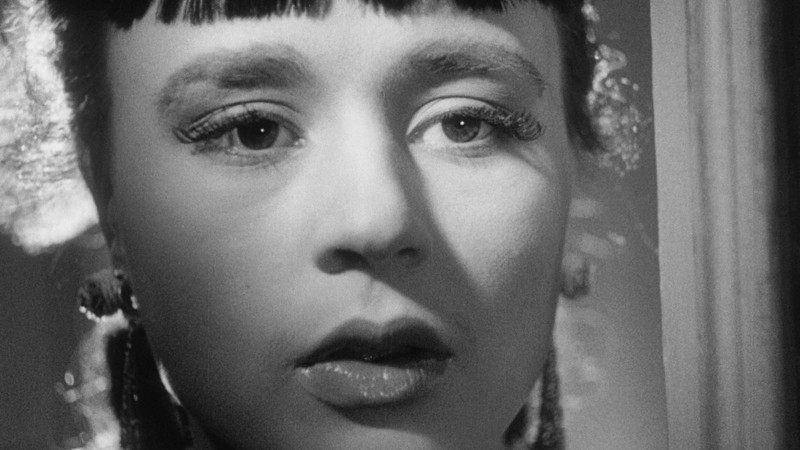Look at the Truth

One of the last surviving stars of Hollywood’s golden age passed away last Sunday. Donna Mae Tjaden’s stint as a singer at the Hollywood Canteen during the Second World War led to a contract with Warner Bros.—and a name change: Janis Paige. “A redheaded triple-threat, Paige spent the 1940s as one of the busiest actors in Jack Warner’s stable,” writes Gina Piccalo in the Los Angeles Times. “By the 1950s, she was as famous for her sex appeal as she was for her sass.”
- Talking to novelist and filmmaker Bridgett M. Davis about the new restoration of Naked Acts (1996) shepherded by Black Film Archive founder Maya S. Cade, RogerEbert.com’s Marya E. Gates recalled that Davis once said that “the idea for the film started with the question: If Dorothy Dandridge had a daughter and her daughter was Pam Grier, what would her granddaughter be?” One possible answer is Cece (Jake-Ann Jones), an aspiring actress who has landed a challenging role in an independent film. When the restoration screened in Rotterdam, programmer Olaf Möller noted that it “remains Davis’s sole fiction feature. Why wouldn’t one want to see more from a filmmaker capable of such subtleties and unforced kindness, a mind long on intelligence and short on attitude?”
- Viewers new to the art and activism of Nan Goldin learn in Laura Poitras’s All the Beauty and the Bloodshed (2022) that the catalyst for her work is the death of her older sister, Barbara. The girls’ parents interpreted Barbara’s teenage vivaciousness as mental illness and had her locked away. In 1965, when she was eighteen, Barbara killed herself. Goldin’s Sisters, Saints, Sibyls (2004–22) is a three-channel video currently on view in a deconsecrated Welsh chapel in London through June 23. Watching it, Adrian Searle, who interviews Goldin for the Guardian, finds that “I can’t look away, but some moments are difficult to witness.” In Gagosian Quarterly, exhibition organizer Michael Cary asks, “How do you make a life-affirming film about suicide, abuse, addiction, and constraint? You look at the truth.”
- Known first and foremost for his debut feature, House (1977), one of the most entertainingly insane movies ever made, Nobuhiko Obayashi directed more than seventy films before he passed away in 2020. New York’s Metrograph and the Criterion Channel are showcasing his work, and one of the standouts in both programs is Beijing Watermelon (1989), in which a Japanese grocer takes a group of Chinese exchange students under his wing. Writing for Metrograph Journal, Matt Turner suggests that Beijing Watermelon “makes an argument for Obayashi’s films to be understood as not only works replete with outlandish formal flourishes and invention, but also as notable for the unabashed humanism at the core of them all, regardless of genre or approach.”
- Another Criterion Channel program, Directed by Paul Schrader, has prompted an overview of the oeuvre from Charles Bramesco in the Guardian. “The cycle of transgression, penance, and desperate grasping for salvation never stops, its eternal incompletion a key plank in Schrader’s repulsed view of humanity as fallible, alienated and forever at the mercy of its own urges,” writes Bramesco. “In the last image before Affliction’s outro coda of voiceover, Nick Nolte’s shattered small-town cop sits at a kitchen table, drinking with a straight-ahead stare while a barn and the corpse inside it burn in the background. Schrader imbues all of his antiheroes with a piece of himself, but this shot in particular condenses his essence to one indelible sight: God’s lonely man, maintaining intense focus even as calamity swallows up the world around him.”
- Let’s wrap with notes on a few new publications. Online from the latest Cineaste are substantial previews of articles on Setsuko Hara and The Zone of Interest, full reviews of Raoul Walsh’s The Roaring Twenties (1939) and Yuzo Kawashima’s Elegant Beast (1962), and a conversation with Max Tohline about his 131-minute video essay, A Supercut of Supercuts (2021). The Brooklyn Rail’s June issue includes articles on this year’s Prismatic Ground, Jiajun “Oscar” Zhang’s All, or Nothing at All, Ashley Sabin and David Redmon’s Kim’s Video, and Charlie Shackleton’s short film, Lateral. And announcing the launch of e-flux Film Notes, Lukas Brasiskis maps the overlap between the worlds of art and cinema.



